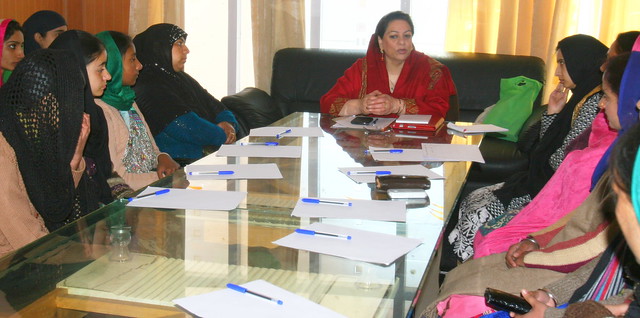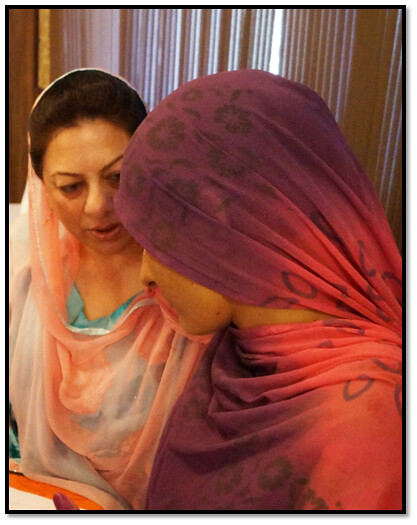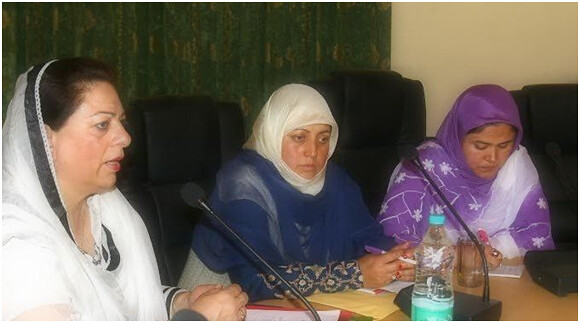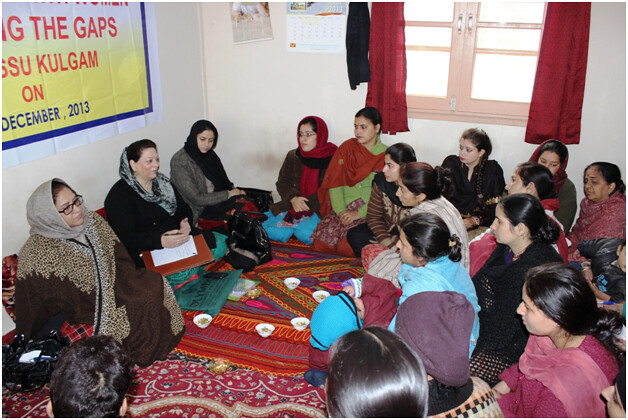Peace and conflict in Kashmir are linked to patriarchal interventions in Kashmir. “The women don’t have a slightest idea about it. They feel it as a man’s job. I went to the women and made them conscious regarding their stake in peace building,” says Ezabir Ali.
By Raqib Hameed Naik, TwoCircles.net
Srinagar: She has been helping women in conflict for over two decades. Overcoming the shackles of traditional Kashmir society, a women in this conflict zone speaks about empowering the women, socially and economically, for which she has trained around 5,000 poor women in the concept of self-help groups, Thrift and Credit etc.
But for a mostly silent worker through her organization Ehsaas, Ezabir Ali’s name made news when she was instrumental in the fatwa issued by a group of Ulema’s decreeing that ‘half-widows’ – women whose husbands have disappeared due to the conflict prevailing during the last two decades – can remarry if their spouses remained untraced for four years.
A case in point is Maimoona, wife of Akhtar Hussain Bhat (victim) of Babademb, Khanyar. After her husband disappeared in February 1999, Maimoona, a half-widow, was living alone with her only child. “No one cares for us. I even attempted suicide once to put an end to my ordeal. I had to plead before my brother to provide me a single room where I could live with my only child as my in-laws denied me any rights to my husband’s share in the family property. We were driven away by them,” Maimoona narrated her woeful tale as she broke in tears recalling how her in-laws never took the pains to find her missing husband.
“Earlier, no one bothered about the ways to end our sufferings, no one was bothered about our predicament. Now, I am grateful to Ezabir Ali, who had taken up our issue with the Ulema which ruled four years as waiting period,” Maimoona, who now lives with support from another NGO, says.
There was lot of ambiguity in between different religious sects over the period of wait: some set four years and some set 90 years as waiting period for the women, whose husband had disappeared due to conflict. “It was very tough to bring all the Ulemas of different Muslim sects on a single platform and hold deliberations. Team member of ‘Ehsaas’ and I made hectic efforts and finally all were willing to address the issue,” Ali says.
After the consultations on the issue, the Ulemas (scholars) representing various institutions and organizations issued a joint statement in December 2013 saying any half-widow who intends to remarry can do so after four years. “This was a huge success for every Kashmiri women who was toiling in this never ending conflict,” says Ali.
Since last 22 years, Ali has been working for the development of women and children. She has trained over 150 people as ‘barefoot’ counselors in the region, mostly to support women who are experiencing tension and post-traumatic stress disorder (PTSD) as a result of the conflict. In her late 40s, from an upper middle class family in Srinagar, Ali did her basic schooling from Nyeri (Kenya), where her father Ali Mohammad Mir, a retired IAS officer, was posted as an Advisor to the Government of Kenya. She returned to Kashmir in early 1980s, completed her undergraduate degree in Psychology Master’s with English Literature from Kashmir University and then did her Master’s in Development Studies from University of East Anglia, Norwich (United Kingdom).

Ali credits her ‘socially conscious activities’ to her father, who after retirement had adopted few villages in Budgam and Pulwama where he started community health related activities.
Presently Ali is a consultant with Women’s Project and secretary ‘Ehsaas’ and one of the core members of a women’s group in Kashmir known as Athwas (meaning handshake), supported by ‘Women in Security and Conflict Management and Peace’ (WISCOMP).
“During the conflict in Kashmir since last more than 22 years now, women have been suffering silently and have become mute spectators in the on-going initiative for the peace-process. I have, as part of the group, tried to bridge the gap between different communities through the process of non-violence, dialogue and listening skills. These are the different communities that migrated from the state (Hindus, Muslims & Sikhs). We try to re-create confidence amongst various sections of the society.”

Peace and conflict in Kashmir are linked to patriarchal interventions in Kashmir. “The women don’t have a slightest idea about it. They feel it as a man’s job. I went to the women and made them conscious regarding their stake in peace building,” says Ezabir.
Socio-economic empowerment of women/psycho-social counselor, trainer
Ali has been working for the development of women and children in the rural areas of Jammu and Kashmir for the last more than 15 years and almost trained more than 5,000 women living below poverty line in the concept of group formation, Self Help Groups, Thrift and Credit as well women living in the migrant camps in Jammu in the concept of self-help. “I have been able to empower women from different communities to relate to each other and to those in stress and displaying signs of trauma by training different target groups such as Community Health Workers/ teachers/ Village Level Workers to meet the psychosocial problems created by armed conflict in Kashmir,” says Ali.

She has been associated with Conciliation Resource (CR) since 2009 as a local coordinator on the Indian side of LoC. She has done a mapping exercise to document the experiences of women (from different backgrounds, professions, regions, ethnicity) for looking at possible ways to enhance their role and involvement in Peace building, such that women themselves suggest a way forward not just in terms of what everyone can do to make their positions better in society but also what they themselves would like to do for the same.
Other initiatives-involving women in Kashmir
As one of the Board members of the J&K Voluntary Health and Development Association (JK VHADA), which is a non-profit, non-political organization, started working in rural areas in 1997 to promote community health and development related activities, Ali has worked extensively to substitute the already affected health sector in Kashmir due to conflict.
Shahazada, 49, of Nawhar Budgam, is a trained craft teacher by J&K VHADA to help women learn skills of income generation. “We were introduced to the concept of “self-help” by Ezabir Ali, who guided me in the process of formation of SHGs, which in turn helped us in our economic empowerment,” Shahazada told TwoCircles.net.
Another example is Shafiqa Bano, 25, from Wakherwan Pulwama, who was going through depression as she was exposed to domestic violence. She has two children. “My husband would regularly beat me up. I was suffering in silence. I was counseled by Ezabir ma’am and I joined the self-help group to learn embroidery and tailoring. This has given me financial security and moral strength as I felt part of the group and not alone. My husband felt threatened with my new found independence and was left with no alternative but to change his attitude towards me. He now thinks twice before raising his hand on me,” says a confident Shafiqa.
Literate girls from villages are imparted basic training so that they can help people in their respective areas by providing them basic health care facility right at their door steps by “Door to door knocking.”

Due to the unrest in the state, women have become widows and children orphaned as they have lost the bread earners of the family, leading to frustration and suicidal tendencies among women. Ali and her organization was instrumental in setting up a ‘Samanbal’ (meaning a meeting place) center in West Kashmir which serves as common meeting place for the women of these villages to come together and discuss issues related to livelihood and articulate their concerns on various social issues. This is being used for counseling people, especially women who are undergoing stress, tensions, trauma, violence and many other social issues. “This Samanbal, the ‘safe spaces’ allowed women to come together to articulate their concerns to policy makers and government interlocutors,” she says.
The Samanbal Center is being run by trained Village Health Workers known as the “bare foot counselors” who are working with Jammu and Kashmir Voluntary Health Association (JKVHA) of which Ezabir is one of the board members and implementing a Community Health and Development related programme in these villages. It is these community Health Workers that have been provided additional skills to deal with issues related to mental health so that they can help people, especially women.
Ali might not be a popular name among the social work circles in India but she has silently brought about the difference by her initiatives that are empowering the Kashmiri women.
Related:

